Skardu Valley by Air – 8 Days of Adventure & Beauty
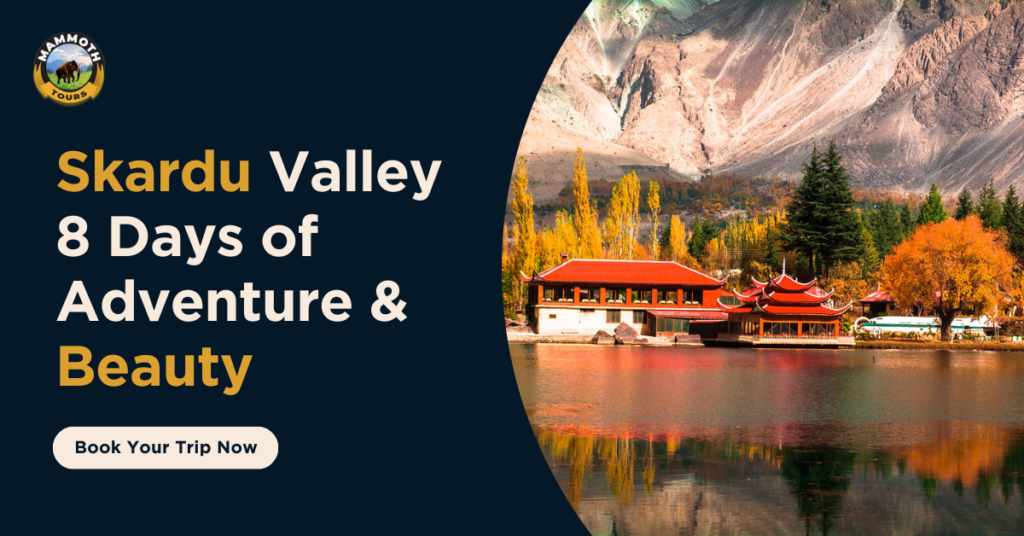
Why Skardu Should Be Your Next Destination 🏔️ Experience Skardu Valley – A Hidden Gem for Travelers Nestled in the northern region of Pakistan, Skardu Valley is a paradise for nature lovers, adventure seekers, and cultural explorers. With majestic mountains, crystal-clear lakes, lush green valleys, and golden deserts, Skardu Valley is one of the most breathtaking destinations in the world. Whether you’re looking for a relaxing getaway, an off-the-grid adventure, or an immersive cultural experience, this 8-day Skardu Valley tour by air is the perfect choice! This international tourist-friendly trip is designed to provide a seamless travel experience from Islamabad to Skardu Valley, offering luxury accommodations, private transport, professional guides, and exclusive sightseeing tours. ✈️ Effortless Travel – Fly Directly to Skardu! Getting to Skardu Valley has never been easier! Instead of long and tiring road journeys, this package includes a hassle-free domestic flight from Islamabad to Skardu. Enjoy aerial views of the Karakoram mountain range, Nanga Parbat (the world’s ninth-highest peak), and the mesmerizing valleys before landing in Skardu Valley, where your adventure begins. 🌟 Why Choose This 8-Day Skardu Valley Tour? 1️⃣ Stress-Free Travel for International Tourists Worried about planning everything yourself? We’ve got you covered! Our all-inclusive package ensures a smooth experience, from visa assistance to domestic flights, transport, and accommodations. 2️⃣ Explore Skardu’s Top Attractions 3️⃣ Luxury & Comfort Throughout Your Journey 📅 Best Time to Visit Skardu Valley (March – November 2025) This tour is available from March to November, making it the perfect escape for:✅ Spring Travelers – Witness blooming flowers and mild weather.✅ Summer Explorers – Enjoy lush green valleys, clear lakes, and warm sunny days.✅ Autumn Adventurers – Capture the golden hues of Skardu’s fall season. 💰 Affordable Luxury – Tour Price & Discounts This 8-day trip costs just USD $899 per person! (Group discounts available – Contact us for details!) 🚀 Ready to explore Skardu Valley? Well see here as we dive into the full itinerary and daily activities! Day-by-Day Itinerary – Your Ultimate Skardu Adventure Now that you know why Skardu Valley should be your next travel destination, let’s dive into the detailed 8-day itinerary. From exploring pristine lakes to venturing into breathtaking valleys, every day brings a new adventure! 🛤 Day 1: Welcome to Pakistan – Islamabad City Tour ✈ Arrival in Islamabad – Meet & greet at the airport.🏨 Transfer to FT Residencia Guest House (G-13, Islamabad) for rest.🏙 Half-day Islamabad city tour, covering: 🏔 Day 2: Fly to Skardu & Explore Shangrilla & Upper Kachura 🍽 Breakfast at the guest house before heading to the airport.✈ Flight from Islamabad to Skardu – A scenic journey over the Himalayas & Karakoram!🚗 Pickup from Skardu Airport in a luxury private TZ Prado with a dedicated driver & tour manager.🏨 Check-in & refresh at your hotel in Skardu Valley.🛶 Visit Shangrilla Lake & Resort – A magical, heart-shaped lake surrounded by lush greenery.🏞 Explore Upper Kachura Lake – A stunning, lesser-known alpine lake.🛶 Optional Boating at Upper Kachura Lake (Highly recommended!)🌄 Soq Valley Exploration – A peaceful retreat with breathtaking landscapes.🍽 Dinner & overnight stay in Skardu (Eat and Read Hotel / The Legends Hotel / Himalaya Hotel). 🚙 Day 3: Basho Valley or Deosai Plains – Off-Road Adventure 🍽 Breakfast at the hotel before starting an adventure-filled day!🚗 Jeep ride through rugged terrain to either: 🏞 Day 4: Chunda Valley, Katpana Desert & Skardu City Tour 🍽 Breakfast at the hotel before setting out for a day of stunning landscapes.🚙 Visit Chunda Valley – A hidden gem with panoramic views of Skardu.🏜 Explore Katpana Desert, one of the world’s highest cold deserts.🏙 Skardu City Tour – Visit the bustling local market & get a taste of Skardu’s culture.🍽 Dinner & night stay in Skardu. 🏰 Day 5: Shigar Valley, Fort & Cold Desert Experience 🍽 Breakfast at the hotel before heading towards Shigar Valley.🏰 Visit Shigar Fort – A beautifully restored 17th-century fort.🏞 Explore Blind Lake – A serene, untouched lake with spectacular views.🏜 Experience the Safaranga Cold Desert – A surreal mix of sand dunes & snow-capped mountains.🏨 Check-in at your hotel in Shigar.🍽 Dinner & overnight stay in Shigar (Himmel Skardu / Khoj Resorts). 🌊 Day 6: Mantokha Waterfall & Khaplu Valley Exploration 🍽 Breakfast at the hotel, then travel towards Kharmang Valley.🌊 Visit Mantokha Waterfall – A mesmerizing natural wonder.🏰 Explore Khaplu Valley – A historic valley surrounded by towering peaks.🏚 Visit Khaplu Palace & Forest – Step into history & enjoy breathtaking landscapes.🚗 Return to Skardu by evening.🍽 Dinner & night stay in Skardu. ✈ Day 7: Return Flight to Islamabad & Evening City Tour 🍽 Breakfast at the hotel before heading to the airport.✈ Flight from Skardu to Islamabad – Enjoy the aerial views one last time!🚗 Pickup from Islamabad Airport & transfer to your guest house.🏙 Half-day evening tour of Islamabad, covering: 🛫 Day 8: Farewell & Departure 🍽 Breakfast at the hotel.🏙 Half-day Islamabad city tour, visiting: What’s Included, Accommodations & Why This Trip is a Must-Do! Now that you’ve seen the full day-by-day itinerary, let’s go over what’s included, where you’ll stay, and why this trip is a once-in-a-lifetime experience. ✅ What’s Included in Your Trip? We’ve taken care of everything so you can focus on enjoying the journey. Here’s what’s included in your Skardu Valley – By Air (08 Days) Tour: 📜 Services Included ✔ Visa Assistance & Letter of Invitation – We help international travelers with visa processing.✔ Round-Trip Domestic Flights – Islamabad ✈ Skardu ✈ Islamabad.✔ Luxury Private Transport – Including latest model Corolla, BRV, Grand Cabin, Saloon Coaster (Islamabad transfers), and TZ Prado (Skardu Airport to Skardu Airport).✔ Professional Native Drivers & Tour Manager – Experience the journey with a knowledgeable guide.✔ All Sightseeing Tours – As per the itinerary, covering lakes, valleys, forts, waterfalls & deserts.✔ Boating at Upper Kachura Lake – A peaceful & scenic boat ride included!✔ Deluxe Hotel Accommodation (7 Nights) – Twin-sharing basis (2 persons per room).✔ Quality Meals – 07
14-Day Hunza and Skardu Road Trip – A Journey of a Lifetime
🏔 A Breathtaking 14-Day Road Trip Through Hunza and Skardu If you’ve ever dreamed of exploring breathtaking mountain landscapes, crystal-clear lakes, and ancient forts, then this 14-day road trip to Hunza and Skardu is perfect for you. This journey takes you through Pakistan’s most beautiful northern valleys, where nature meets history, adventure, and culture. You’ll travel through the legendary Karakoram Highway, witness the meeting point of three great mountain ranges (Himalayas, Karakoram, and Hindu Kush), explore the majestic Rakaposhi viewpoint, and stand in awe of the stunning Attabad Lake, Passu Cones, and Deosai Plains. From the bustling streets of Islamabad to the serene landscapes of Skardu, this road trip offers the best of Pakistan’s natural beauty. Whether you are a photographer, a thrill-seeker, or just looking for a relaxing getaway, this tour has something for everyone. 🌍 Who Is This Trip For? This 14-day road trip is designed for travelers from all backgrounds who want to explore the hidden gems of Northern Pakistan. Whether you’re a solo traveler, a couple, a group of friends, or a family, this tour is packed with experiences that cater to all types of travelers. ✨ Perfect for: ✅ Adventure Lovers – If you enjoy off-roading, trekking, and exploring remote valleys, this trip is packed with thrilling experiences like Basho Valley, Deosai Plains, and Passu Cones. ✅ Nature Enthusiasts – From lush green valleys to snow-capped peaks, the landscapes on this tour will leave you speechless. Attabad Lake, Upper Kachura, and Blind Lake are just a few examples of nature’s magic. ✅ Culture & History Explorers – Visit ancient forts like Baltit, Shigar, and Khaplu Palace, and immerse yourself in the local Hunza and Skardu cultures. ✅ Photography & Videography Enthusiasts – Capture some of the most stunning landscapes in the world, from majestic mountains to turquoise lakes and traditional bazaars. ✅ Honeymoon Couples & Families – If you’re looking for a romantic getaway or a family-friendly tour, this trip offers luxury hotels, comfortable transport, and breathtaking scenic spots. No matter what kind of traveler you are, this journey through Northern Pakistan is truly unforgettable! 🛤 Day-by-Day Itinerary – Explore Pakistan’s Hidden Gems Embark on an unforgettable 14-day adventure across Pakistan’s most breathtaking landscapes. From the vibrant streets of Islamabad to the majestic mountains of Hunza and Skardu, this itinerary is designed for travelers seeking both adventure and cultural immersion. ✈ Day 1: Welcome to Pakistan – Exploring Islamabad & Journey Begins 🏔 Day 2: Scenic Drive to Gilgit – Witness Majestic Nanga Parbat 🌲 Day 3: Naltar Valley – The Hidden Gem of the North 🏰 Day 4: Hunza Valley & Karimabad – Culture, Forts & Local Markets 🏞 Day 5: Attabad Lake & Passu Cones – A Day of Adventure 🏔 Day 6: Hopar Valley & Rakaposhi View – Nature’s Masterpiece 🏔 Day 7: Journey to Skardu – Shangrila, Kachura Lake & More 🏕 Day 8: Off-Road Adventure – Basho Valley or Deosai Plains 🌊 Day 9: Shigar Valley, Blind Lake & Cold Desert Exploration ⛰ Day 10: Mantokha Waterfall & The Serenity of Khaplu Valley 🏜 Day 11: Katpana Desert & Departure from Skardu to Gilgit 🛤 Day 12: Return Journey to Balakot or Besham 🏙 Day 13: Back to Islamabad & City Tour ✈ Day 14: Departure – A Trip to Remember This itinerary ensures an immersive, well-paced, and adventure-filled experience, covering some of the most stunning locations in Pakistan. 🎒 What’s Included in This Hunza and Skardu Tour Package? This all-inclusive tour package is designed to provide a hassle-free and comfortable travel experience. Here’s what’s included: 🏨 Accommodation: ✔️ 13 nights of premium hotel stays in Islamabad, Gilgit, Shigar, Hunza and Skardu.✔️ Luxury camps/hotels for unique experiences in remote valleys. 🚗 Transport & Transfers: ✔️ Private 4×4 vehicles for off-road destinations.✔️ Comfortable air-conditioned transport for city and highway travel.✔️ Airport pick-up and drop-off. 🍽 Meals & Refreshments: ✔️ Daily breakfast, lunch, and dinner, featuring local and international cuisine.✔️ Tea and snacks during road journeys. 🏔 Guided Tours & Activities: ✔️ Professional local guides for cultural insights and history.✔️ Guided tours of forts, valleys, lakes, and national parks.✔️ Boating, jet skiing, and hiking experiences in scenic locations. 🎟 Entry Fees & Permits: ✔️ All entry fees for historical sites, national parks, and forts.✔️ Special permits for restricted areas. 📸 Photography & Memories: ✔️ Professional travel photography at key locations.✔️ Drone photography (where permitted). 🏕 Adventure Add-Ons (Optional): ➕ Trekking and hiking tours for adventure enthusiasts.➕ Paragliding, river rafting, and camping (available on request). ❌ What’s Not Included? While this tour package is all-inclusive, a few things are not covered to allow you flexibility in planning your trip: ❌ Exclusions: 🚫 International flights – You’ll need to book your flights to and from Pakistan separately.🚫 Personal expenses – Souvenirs, snacks, and additional meals outside the provided package.🚫 Travel insurance – We highly recommend purchasing comprehensive travel insurance before your trip.🚫 Visa fees – Assistance is provided, but the actual visa costs depend on your nationality.🚫 Tips & gratuities – For drivers, guides, and hotel staff (tipping is appreciated but not mandatory).🚫 Additional adventure activities – Optional experiences like paragliding, river rafting, and trekking can be arranged at extra cost. Our team ensures transparency with no hidden charges—everything included in the package is clearly mentioned! 🏨 Where You’ll Stay – Deluxe Hotels & Comfortable Stays Throughout this 14-day journey, you’ll be staying at premium hotels, luxury lodges, and comfortable guesthouses, ensuring both relaxation and adventure. 🏙 Islamabad (Arrival & Departure): 🏨 4-star hotel with modern amenities.🛏 Comfortable rooms, high-speed Wi-Fi, and a lavish breakfast. 🏔 Gilgit & Hunza: 🏡 Traditional-style guesthouses with stunning mountain views.🔥 Cozy interiors and local hospitality for an authentic experience. 🌲 Skardu & Shigar: 🏕 Luxury camps and lodges surrounded by breathtaking landscapes.🍽 On-site dining with local and international cuisine. 🏞 Khaplu & Remote Valleys: 🌿 Boutique resorts or eco-friendly guesthouses close to nature.🎑 A mix of modern comfort and traditional charm. All accommodations are handpicked to provide
Discover Hunza Valley: A Breathtaking 9-Day Adventure
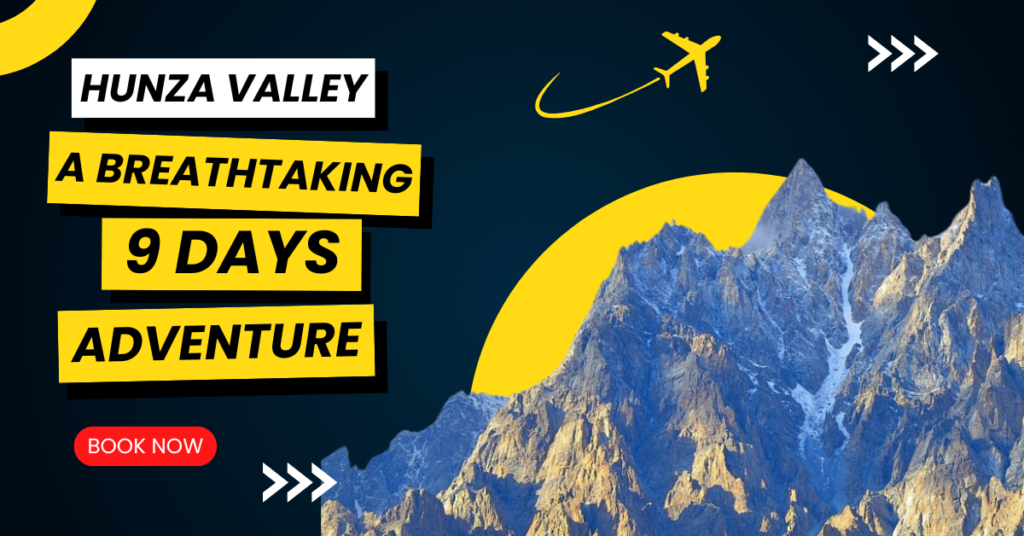
🏔 Why Hunza Valley Should Be on Your Travel Bucket List in 2025 Nestled in the heart of the Karakoram mountain range, Hunza Valley is one of Pakistan’s most breathtaking and sought-after destinations. With its breathtaking landscapes, rich cultural heritage, and world-famous hospitality, it has become a top choice for travelers from the USA, UK, Canada, UAE, Australia, and Europe. If you’re dreaming of an exotic getaway, a 9-day road trip through Hunza Valley is the perfect way to experience the true beauty of Pakistan. Whether you’re an adventure enthusiast, a nature lover, or simply someone looking for a unique travel experience, this tour offers unforgettable moments. This detailed 9-day itinerary will guide you through Islamabad, Gilgit, Hunza Valley, Naltar Valley, Attabad Lake, Passu Cones, Hopar Glacier, and more. 🚗 A 9-Day Journey Through the Heart of Pakistan’s Northern Beauty Our 9-day road trip offers an all-inclusive package, including airport pickup, deluxe accommodations, guided tours, and meals. Travelers will get to witness majestic landscapes, ancient forts, high-altitude lakes, and warm local culture. Whether you’re traveling from New York, London, Toronto, Dubai, or Sydney, this perfectly curated package ensures a seamless and hassle-free experience for overseas tourists. 🌍 Designed for Travelers from the US, UK, Canada & Beyond We understand the needs of international tourists, ensuring: ✔️ Visa Assistance & Invitation Letter for smooth entry.✔️ English-Speaking Tour Guides for an effortless travel experience.✔️ Luxury Transport & Accommodations for a comfortable journey.✔️ Customized Itineraries tailored to personal preferences. 🏔 Experience the Majestic Karakoram Highway & Mountain Ranges One of the top highlights of this trip is the breathtaking Karakoram Highway (KKH)—one of the highest paved roads in the world. Connecting Pakistan with China, this legendary route offers scenic views of the Himalayas, Karakoram, and Hindu Kush mountain ranges. 🏡 Stay in Deluxe Hotels with Top-Notch Hospitality From Islamabad to Hunza, we provide premium hotel stays at some of the best-rated accommodations, ensuring a luxurious yet culturally immersive experience. 🏨 Hotels Include:✔️ Mandarin Inn Hotel (Gilgit)✔️ The Legends Hotel (Hunza)✔️ Luxus Hunza (Attabad Lake)✔️ Cordillera Resorts (Balakot) 🎒 Top Attractions & Experiences You Can’t Miss This 9-day journey includes a variety of experiences, from historical landmarks to natural wonders. 🏰 Explore Karimabad Bazar & Historical Forts of Hunza ✔️ Visit the Baltit Fort & Altit Fort, dating back over 700 years.✔️ Explore Karimabad Bazar, known for handmade souvenirs, handicrafts, gemstones, and cultural artifacts. 🚣♂️ Boating at Attabad Lake – A Scenic Paradise Attabad Lake is one of the most beautiful lakes in Pakistan, formed due to a landslide in 2010. ✔️ Crystal-clear blue waters surrounded by towering peaks.✔️ Boating, kayaking, and jet skiing experiences. 🌉 Cross the Famous Hussaini Suspension Bridge Hussaini Bridge is one of the most adventurous and thrilling bridges in the world. ✔️ A must-visit spot for adventure seekers.✔️ Experience the thrill of walking across a high-altitude suspension bridge. 🌄 Sunset Views from Duikar – Eagle’s Nest Duikar, also known as Eagle’s Nest, is the highest viewpoint in Hunza Valley, offering panoramic views of 7 majestic peaks, including: ✔️ Rakaposhi (7,788m)✔️ Ultar Sar (7,388m)✔️ Ladyfinger Peak (6,000m) ❄️ Visit the Stunning Hopar Glacier & Nagar Valley ✔️ Witness the spectacular Hopar Glacier in Nagar Valley.✔️ Explore Nomal & Minapin Villages, rich in culture and scenic beauty. 🌍 A Stress-Free & Fully Guided Tour – Perfect for International Travelers We provide end-to-end travel solutions to ensure a comfortable experience for overseas visitors. ✈️ Airport Pickup & Drop-Off – Smooth Arrival & Departure ✔️ We provide VIP airport transfers in Islamabad.✔️ Our representative will assist you at the airport to ensure a hassle-free arrival. 🚗 Luxury Private Transport with Professional Drivers ✔️ Latest model vehicles, including BRV, Grand Cabin, Saloon Coaster.✔️ Comfortable seating, air-conditioning, and safety features. 🍽 Delicious Meals & Authentic Pakistani Cuisine ✔️ 8 Breakfasts + 8 Dinners included.✔️ Taste Pakistani, Continental, and Local Hunzai cuisine. 📅 How to Book Your Hunza Valley Trip Today Booking your 2025 Hunza Valley adventure is simple and hassle-free. 📅 Tour Dates & Customization Options Available ✔️ Valid from March 2025 – November 2025.✔️ Customize your trip for groups & families. 💲 Affordable Pricing & Group Discounts ✔️ Starting at $699 per person.✔️ Special discounts available for groups. 📞 Contact Us & Secure Your Spot for 2025! 📧 Email: info@mammothtours.pk📞 WhatsApp: +923132267694🌐 Website: https://mammothtours.pk 🔹 Don’t miss out on this incredible opportunity! Book your Hunza Valley trip today and experience the adventure of a lifetime. 🚀 Final Thoughts – Why You Should Visit Hunza Valley in 2025 Hunza Valley is Pakistan’s crown jewel, offering an unforgettable travel experience. With its breathtaking landscapes, rich history, and adventure-packed activities, it’s the perfect destination for overseas travelers looking for a unique getaway. Don’t wait! Secure your spot for this incredible adventure today. 🌍✈️
Best Things to Do in Malam Jabba: The Perfect Winter Getaway
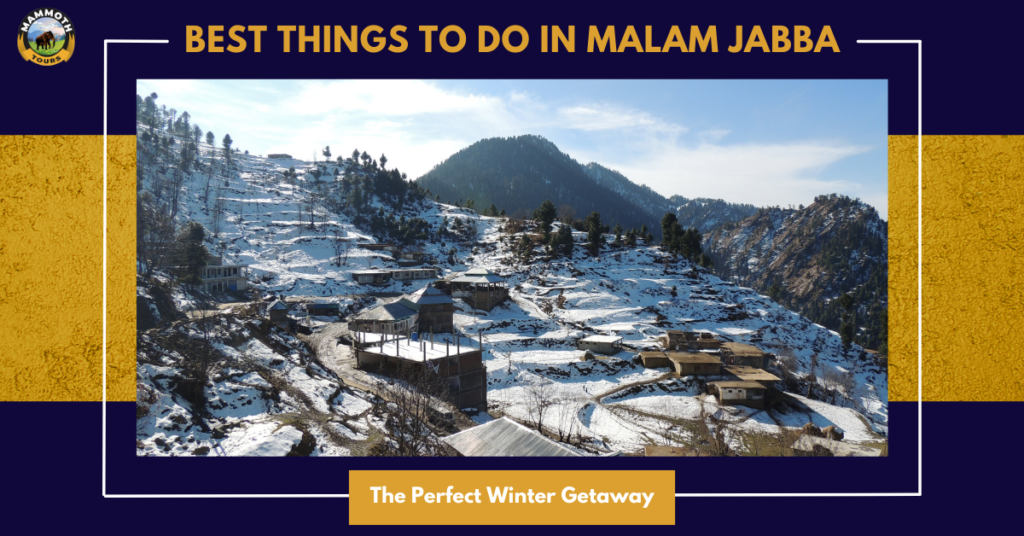
Malam Jabba, nestled in the scenic Swat Valley of Pakistan, is a winter wonderland that transforms into the ultimate getaway for thrill-seekers and serenity lovers alike. Renowned as Pakistan’s premier winter sports destination, Malam Jabba boasts pristine snow-covered slopes, stunning landscapes, and a variety of exhilarating activities. Whether you’re a fan of skiing, trekking, or simply savoring delicious winter cuisine, this magical destination has something for everyone. If you’re planning your next winter holiday, our guide to Malam Jabba winter activities will help you make the most of your visit to this snowy paradise. Top Activities to Enjoy in Malam Jabba Malam Jabba offers a variety of activities that cater to adventure enthusiasts and casual travelers alike. Here’s a closer look at the best experiences this winter haven has to offer: 1. Skiing and Snowboarding Malam Jabba is synonymous with skiing and snowboarding, making it a must-visit for winter sports enthusiasts. Its well-maintained slopes cater to both beginners and advanced skiers, while the breathtaking views of the surrounding snow-clad mountains enhance the experience. Why Choose Malam Jabba for Skiing? Pro Tip: Visit between December and February for the best skiing conditions. 2. Chair Lift and Zip Line Adventures For those seeking an adrenaline rush, the chair lift and zip line at Malam Jabba are not to be missed. Chair Lift Ride Zip Line Thrills Pro Tip: Early morning rides offer the best views, with clear skies and golden sunlight. 3. Trekking and Hiking in the Snow Malam Jabba isn’t just about skiing; its snowy trails make it a haven for trekking and hiking enthusiasts. Popular Winter Trails What to Expect Pro Tip: Wear sturdy, insulated boots and carry trekking poles for better grip on icy trails. 4. Visiting Nearby Swat Attractions Malam Jabba’s proximity to other stunning locations in Swat Valley makes it a perfect base for exploring the region. Mingora and Saidu Sharif Fiza Ghat Park Pro Tip: Allocate a day for nearby excursions to make the most of your trip. 5. Enjoying Local Winter Cuisine No trip to Malam Jabba is complete without indulging in the region’s delightful winter dishes. Must-Try Dishes Pro Tip: Visit local dhabas for authentic flavors and warm hospitality. Best Time to Visit Malam Jabba The ideal time to visit Malam Jabba for winter activities is between December and February. This period offers the heaviest snowfall, making it perfect for skiing and other snow-based activities. However, early winter (November) and late winter (March) are also great for those seeking milder weather and fewer crowds. What to Pack for a Winter Trip to Malam Jabba Packing the right gear is essential for a comfortable trip to Malam Jabba. Here’s a quick checklist: Conclusion: Discover the Magic of Malam Jabba This Winter From thrilling skiing adventures to serene snow-covered trails, Malam Jabba offers a diverse range of winter activities that cater to all types of travelers. Its breathtaking landscapes, combined with exciting attractions like the chair lift, zip line, and local cuisine, make it an unforgettable winter destination. Ready to embark on your snowy adventure? Explore our Malam Jabba tour packages to plan your perfect winter getaway with ease. Let us help you create memories that last a lifetime!
Swat Valley Travel Guide: Everything You Need to Know
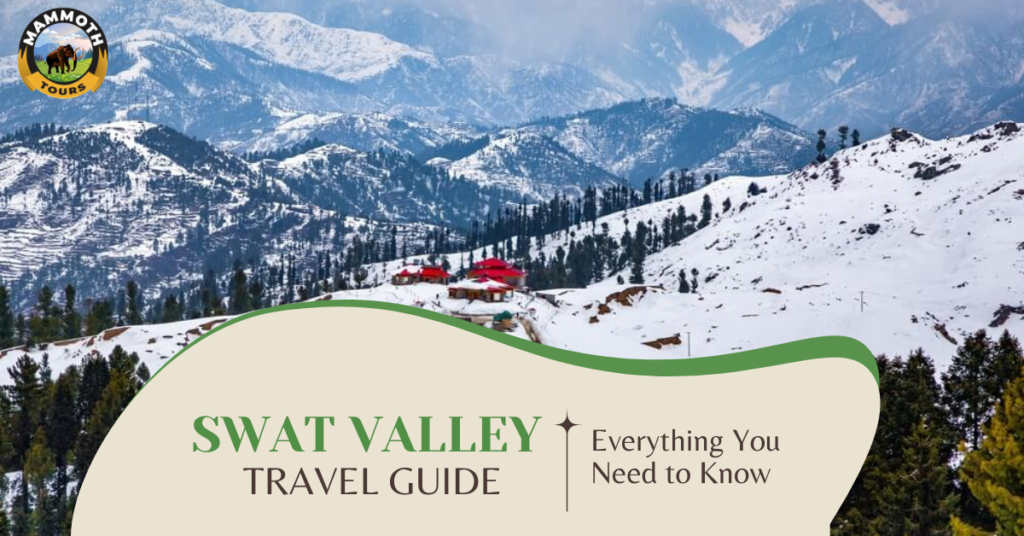
Swat Valley, often referred to as the “Switzerland of the East,” is a mesmerizing destination in northern Pakistan. Famous for its lush green valleys, sparkling rivers, snow-capped peaks, and rich cultural history, Swat has long been a favorite among travelers. Once a hub of Buddhism and now a symbol of natural beauty and tranquility, Swat offers something for everyone, from adventure seekers to history enthusiasts. This Swat Valley travel guide will walk you through the top attractions, best times to visit, travel tips, local cuisine, and must-see cultural heritage sites, ensuring your trip is both memorable and seamless. A Glimpse into Swat Valley’s History Swat Valley boasts a rich history dating back thousands of years. It was a significant center for Buddhist learning, with ancient stupas and monasteries scattered across the region. Alexander the Great is also said to have passed through this valley during his campaigns. Today, Swat is a symbol of resilience, beauty, and cultural heritage, earning its reputation as Pakistan’s crown jewel. Top Attractions in Swat Valley No trip to Swat is complete without exploring its top attractions, each offering a unique experience: 1. Malam Jabba: Pakistan’s Premier Ski Resort Malam Jabba is a must-visit for adventure enthusiasts and families alike. Known for its pristine snow and thrilling slopes, it is Pakistan’s premier ski resort. Activities and Highlights Travel Tips for Malam Jabba 2. Mingora: The Heart of Swat Mingora, the largest city in Swat Valley, serves as its cultural and economic hub. It’s the ideal starting point for your Swat adventure. What to Explore in Mingora Travel Tips for Mingora 3. Kalam Valley: A Paradise of Serenity Nestled deep within Swat, Kalam Valley is a haven for nature lovers. Its untouched beauty, with lush forests, crystal-clear streams, and towering mountains, is unparalleled. Must-Visit Spots in Kalam Valley Travel Tips for Kalam Valley Best Times to Visit Swat Valley Swat Valley offers unique experiences in every season: Travel Tips for Swat Valley Transportation Options Safety Tips Budget-Friendly Tips Local Cuisine and Accommodation Options Must-Try Swati Dishes Accommodation Choices Cultural Heritage Sites in Swat Valley Swat Valley’s cultural heritage is as captivating as its natural beauty: Butkara Stupa A significant Buddhist site, Butkara Stupa is a testament to Swat’s ancient history as a religious and educational center. Udegram Buddhist Monastery Nestled in the hills, this monastery offers a glimpse into Swat’s rich Buddhist past and serves as a peaceful retreat for history buffs. Travel Tips for Heritage Sites FAQs About Swat Valley Conclusion: Plan Your Dream Trip to Swat Valley Swat Valley is a treasure trove of natural beauty, cultural heritage, and thrilling adventures. Whether you’re skiing down the slopes of Malam Jabba, exploring the ancient Butkara Stupa, or marveling at the serene waters of Mahodand Lake, Swat offers unforgettable experiences for every traveler. Ready to explore Swat Valley? Check out our tour packages for tailored itineraries and seamless travel experiences. With Mammoth Tours, your dream adventure awaits!
Discover the Magic of Neelum Valley: A Traveler’s Dream
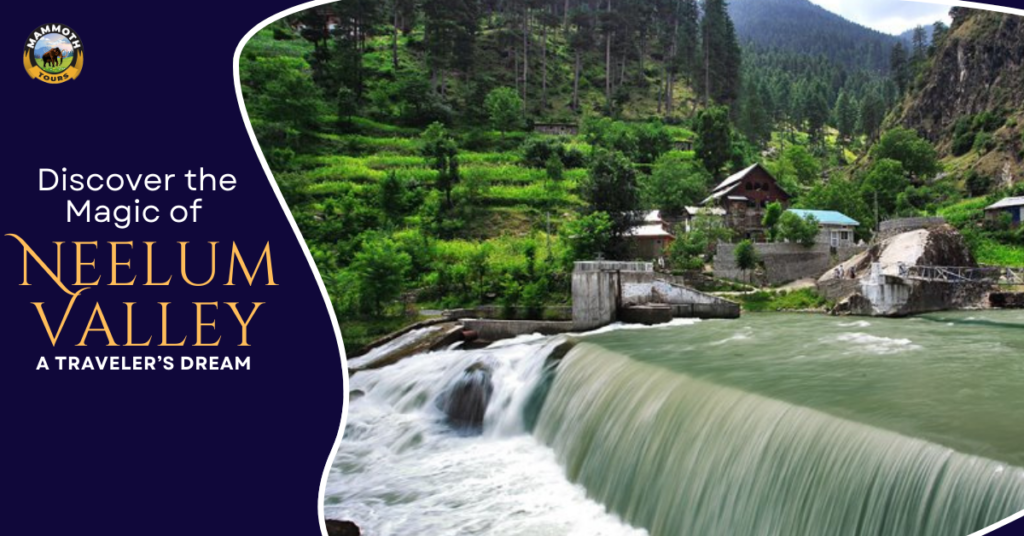
Neelum Valley, often referred to as “Heaven on Earth”, is a breathtaking stretch of land nestled in the Azad Jammu and Kashmir region of Pakistan. Known for its lush green valleys, sparkling rivers, snow-capped peaks, and serene beauty, it’s a haven for nature lovers and adventurers alike. This Neelum Valley travel guide will take you through its top attractions, practical travel tips, and everything you need to plan the perfect trip to this magical destination. Why Visit Neelum Valley? Neelum Valley stands out for its unparalleled beauty and rich cultural heritage. From the mesmerizing Ratti Gali Lake to the ancient ruins of Sharda University, every corner of this valley offers a unique blend of natural splendor and historical intrigue. Whether you’re seeking peace, adventure, or cultural exploration, Neelum Valley has something special for everyone. Top Attractions in Neelum Valley Let’s dive into the must-visit spots in Neelum Valley that make it a traveler’s dream: 1. Ratti Gali Lake: A Jewel in the Mountains Hidden amidst towering peaks, Ratti Gali Lake is a glacial wonder that leaves visitors spellbound. Its crystal-clear waters reflect the surrounding snow-covered mountains, creating a picture-perfect scene. Why Visit Ratti Gali Lake? Travel Tips for Ratti Gali Lake 2. Sharda University Ruins: A Peek into History Sharda University is an archaeological gem that showcases the region’s rich historical and cultural heritage. These ancient ruins are believed to be part of one of the oldest universities in South Asia, dating back to the Buddhist era. What to Explore in Sharda Travel Tips for Sharda 3. Keran and Upper Neelum: Twin Villages of Serenity The twin villages of Keran and Upper Neelum are known for their tranquil beauty and riverside charm. Located along the Neelum River, these villages are perfect for relaxing and soaking in the valley’s serene vibe. Why Visit Keran and Upper Neelum? Travel Tips for Keran and Upper Neelum 4. Arang Kel: The Hidden Village Perched high above the valley, Arang Kel is a small village often described as a “piece of heaven.” Its lush meadows, wooden houses, and peaceful ambiance make it an idyllic escape. What Makes Arang Kel Special? Travel Tips for Arang Kel 5. Halmat and Taobat: The End of the Valley Located at the far end of Neelum Valley, Halmat and Taobat are remote villages that offer raw, untouched beauty. The journey to these villages is an adventure in itself, with winding roads and breathtaking landscapes. What to Expect in Halmat and Taobat Travel Tips for Halmat and Taobat Practical Travel Tips for Neelum Valley Planning a trip to Neelum Valley? Here are some tips to make your journey smooth and enjoyable: Transportation Accommodation Travel Tips for Pakistani Visitors Best Time to Visit Conclusion – Plan Your Dream Trip to Neelum Valley Neelum Valley is more than just a travel destination; it’s a journey into nature’s wonders and cultural richness. From the glacial beauty of Ratti Gali Lake to the historical intrigue of Sharda University, every moment spent here is unforgettable. Ready to explore the magic of Neelum Valley? Check out our tailored tour packages to find the perfect adventure for you. With Mammoth Tours, your dream journey is just a click away!
Exploring Skardu Valley: Top 5 Attractions You Can’t Miss
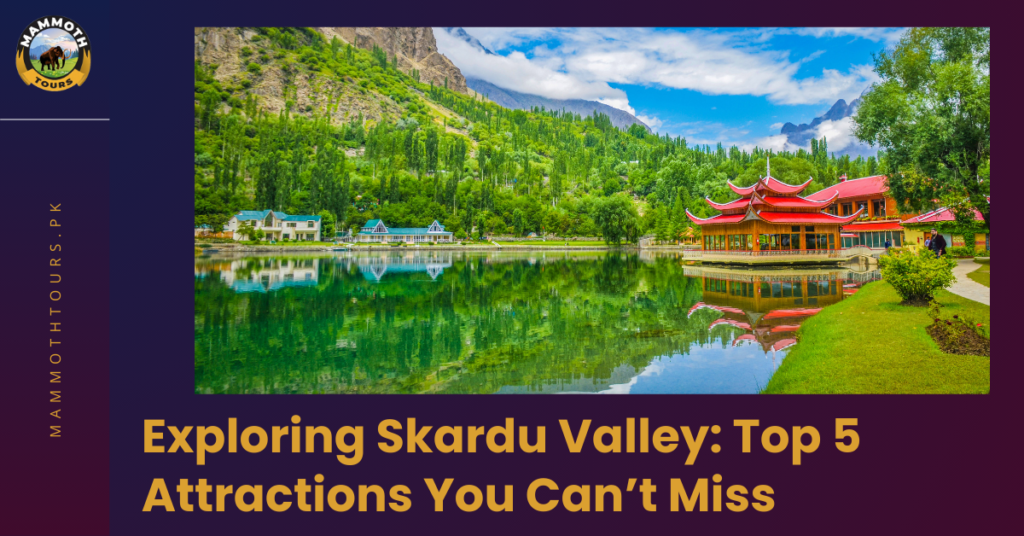
Skardu Valley is a treasure trove of natural beauty and cultural heritage, often referred to as the “Gateway to the Karakoram.” Known for its pristine landscapes, historical landmarks, and adventure opportunities, Skardu Valley captivates every traveler’s heart. Whether you’re a nature lover, a thrill-seeker, or someone eager to explore history, Skardu Valley’s top attractions will leave you spellbound. Here are the 5 must-visit attractions in Skardu Valley that should be on your travel bucket list. 1. Shangrila Resort: Heaven on Earth Nestled near the Lower Kachura Lake, Shangrila Resort is a picturesque retreat that truly lives up to its name, “Heaven on Earth.” Its unique red-roofed cottages and lush gardens offer a perfect escape for travelers seeking peace and tranquility. The Origin of Shangrila Resort The resort was established in the early 1950s and named after the fictional paradise in James Hilton’s novel Lost Horizon. Its serene ambiance has made it a favorite for honeymooners and families alike. What Makes Shangrila Unique? Travel Tips for Shangrila Resort Skardu Valley 2. Satpara Lake: Pristine Waters Satpara Lake is a stunning glacial lake located just 9 kilometers from Skardu Valley. Its turquoise waters, surrounded by rugged mountains, make it one of the most photographed spots in the region. The Mystique of Satpara Legends say the lake holds hidden treasures beneath its surface, adding an element of mystery to its beauty. Things to Do at Satpara Lake Best Time to Visit Satpara The lake is most accessible from May to September when the weather is pleasant and the roads are clear. 3. Deosai National Park: Plains of Giants Known as the “Land of Giants,” Deosai National Park is a high-altitude plateau that stretches as far as the eye can see. It’s one of the world’s highest plateaus and a UNESCO World Heritage Site. Wildlife in Deosai The park is a haven for wildlife enthusiasts, home to rare species like the Himalayan brown bear, snow leopards, and golden marmots. What to See in Deosai Tips for Exploring Deosai Carry warm clothing, as temperatures can drop unexpectedly. Visit between June and August to experience the park in its full glory. 4. Shigar Fort: Historic Landmark Shigar Fort, also known as the “Fort on Rock,” is a beautifully restored 17th-century fort that offers a glimpse into Skardu Valley’s rich history and culture. The Architecture of Shigar Fort The fort is an exquisite blend of Tibetan and Balti architectural styles, showcasing intricate wood carvings and traditional construction techniques. What to Do at Shigar Fort Nearby Attractions Blind Lake: A short drive from the fort, this hidden gem offers serene views and a peaceful atmosphere. 5. Kachura Lakes: Upper and Lower Serenity The Kachura Lakes are a pair of breathtaking water bodies that offer contrasting yet equally enchanting experiences. While Lower Kachura (Shangrila Lake) is developed and tourist-friendly, Upper Kachura is untouched and raw. Lower Kachura Lake (Shangrila Lake) Known for its easy accessibility and facilities, Shangrila Lake is a popular spot for families and honeymooners. Upper Kachura Lake Adventure seekers will love the rugged beauty of Upper Kachura, surrounded by dense pine forests and dramatic mountain peaks. Activities at Kachura Lakes Best Times to Visit Spring, and Summer are ideal for exploring the lakes, but autumn offers stunning foliage for those who prefer quieter visits. Your Skardu Adventure Awaits Skardu Valley is a dream destination for anyone looking to experience the best of nature, culture, and history. From the serenity of Shangrila Resort and Satpara Lake to the wild beauty of Deosai National Park and the historical charm of Shigar Fort, Skardu offers endless opportunities for exploration. Ready to start your adventure? Check out our Skardu Valley tour packages to find the perfect trip for you. With Mammoth Tours, every journey is crafted to create unforgettable memories.
10 Reasons Why Hunza Valley is Pakistan’s Must-Visit Destination
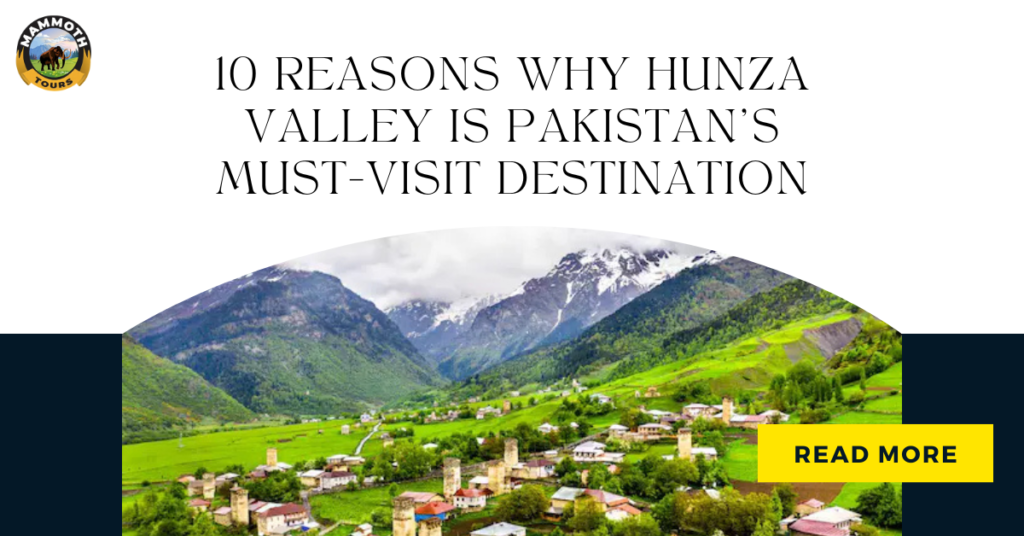
Nestled in the heart of the Gilgit-Baltistan region, Hunza Valley stands as one of Pakistan’s most enchanting and untouched destinations. With its awe-inspiring landscapes, rich cultural heritage, and history dating back centuries, Hunza is the perfect spot for those seeking adventure, serenity, and a chance to immerse themselves in nature’s finest beauty. Whether you’re an adventure seeker, a history buff, or simply in search of a peaceful retreat, Hunza Valley offers something unique for every traveler. Here’s why Hunza Valley is Pakistan’s must-visit destination, and why it should top your travel list this year! 1. Stunning Scenery That Will Take Your Breath Away Hunza Valley is renowned for its breathtaking landscapes that seem almost too beautiful to be real. From the towering peaks of Rakaposhi and Ultar Sar to the lush green terraces and crystal-clear rivers, the valley’s beauty is unparalleled. The landscape transforms with the seasons—snow-covered peaks in winter, vibrant green fields in summer, and golden leaves in autumn. Whether you are standing at the Attabad Lake or gazing at the panoramic views from Eagle’s Nest, the scenery of Hunza will undoubtedly leave you in awe. 2. Warm Hospitality of Locals What sets Hunza apart from other travel destinations is the warm hospitality of its people. The Hunzukutz (locals) are famous for their kindness, friendliness, and openness. A visit to Hunza isn’t complete without engaging with the locals, who will share stories about their culture, traditions, and way of life. You’ll find yourself welcomed with open arms, whether you’re staying in local guesthouses or enjoying a traditional Hunza meal. It’s the perfect destination to feel at home in a foreign land. 3. Delicious Hunza Cuisine Hunza’s cuisine is a delightful mix of healthy, traditional dishes that are both nourishing and delicious. The region’s unique geographical location and climate have influenced the development of distinct flavors. Try Hunza’s apricot-based dishes, including apricot oil, apricot soup, and fresh apricot jam. Don’t miss out on Chapshuro (a local meat pie) and Hunza bread made from locally sourced whole grains. The cuisine is rich in nutritional value, offering a perfect balance for travelers. 4. Historic Sites like Altit and Baltit Forts Hunza is a land steeped in history, and no visit to the valley would be complete without exploring its historic sites. Two of the most famous are the Altit Fort and Baltit Fort. These centuries-old forts not only showcase the region’s ancient architecture but also offer spectacular views of the valley. The Baltit Fort, in particular, was built 700 years ago and is an architectural marvel that reflects Hunza’s rich cultural heritage. Visiting these forts provides a deep dive into Hunza’s fascinating history. 5. Thrilling Trekking Routes For adventure lovers, Hunza Valley offers some of the most thrilling trekking routes in Pakistan. The Passu Glacier Trek is one of the most popular trekking trails, leading through glaciers, alpine meadows, and pristine valleys. Whether you’re a beginner or an experienced trekker, the various trails in Hunza provide options for all levels. The views of towering peaks like Rakaposhi from the trekking paths make the strenuous hike worth every step. 6. Seasonal Attractions One of the most unique aspects of Hunza Valley is the dramatic change in scenery with each season. Autumn is particularly stunning, as the valley transforms into a golden wonderland. The lush greenery gives way to vivid shades of yellow, orange, and red, especially in places like Gulmit and Karimabad. Each season brings new colors, making Hunza a must-visit destination all year round. The cherry blossom season in spring and the snow-covered peaks in winter are also incredibly picturesque. 7. Eco-Friendly Practices Hunza is one of the few regions in Pakistan that places a high emphasis on eco-friendly practices. The valley has long been known for its sustainable farming practices, and the locals take pride in preserving their environment. Whether it’s the use of solar power in homes or the eco-conscious way of managing resources, Hunza is a great example of how travel and sustainability can go hand-in-hand. The valley is working towards making tourism more eco-friendly, ensuring that future generations can enjoy its beauty as much as we do today. 8. Wildlife and Nature Reserves For nature lovers, Hunza Valley offers an abundance of wildlife and nature reserves. The area is home to many unique species, such as the Markhor (wild goat), snow leopards, and various species of birds. If you’re interested in nature photography or wildlife watching, Hunza is the ideal location. The Khunjerab National Park, which is a part of the region, is home to a wide range of wildlife and offers an immersive experience into Hunza’s diverse natural environment. 9. Accessibility Improvements Thanks to ongoing infrastructure improvements, Hunza Valley has become increasingly accessible for travelers. The Karakoram Highway (KKH) provides a direct route to Hunza, allowing visitors to travel comfortably. In addition, the Hunza Airport is now operational with limited flights, further making it easier for tourists to visit. Whether you’re traveling by road or by air, reaching Hunza has never been easier. 10. Unique Cultural Events Hunza is rich in culture and hosts several unique cultural events throughout the year. One of the most prominent is the Shandur Polo Festival, held in the nearby Shandur Pass, where locals engage in the thrilling sport of polo. The Hunza Festival also showcases local music, dance, and handicrafts, offering travelers a chance to experience Hunza’s vibrant culture up close. Check Out our Socials for more. Conclusion: Hunza Valley is more than just a destination—it’s an experience that combines breathtaking beauty, rich culture, and unforgettable adventures. From its stunning landscapes to its warm hospitality, there are countless reasons why it should top your travel bucket list. Whether you’re an adventure enthusiast, a culture lover, or someone seeking tranquility, Hunza has something unique to offer. Ready to explore the magic of Hunza Valley? Check Out Our Exclusive Hunza Valley Tour Packages Here and Start Planning your Dream Trip Today!
Chitral and Kalash Valley
Unveiling the Enchanting Chitral and Kalash Valley: A Journey into Myth and Majesty Nestled amidst the colossal peaks of the Hindu Kush in Pakistan’s Chitral and Kalash Valley, Chitral district resides a land untouched by time – the Kalash Valleys. This mythical realm, cradled by emerald valleys and snow-capped giants, is home to the Kalasha people, an ancient tribe renowned for their vibrant culture and unwavering spirit. A Tapestry of Tradition The Kalasha people, numbering around 4,000, are a unique ethnic group with a rich heritage. Their language, Kalasha-mondr, is distinct from the surrounding tongues, and their belief system, a fascinating blend of animism and ancient Hinduism, sets them apart. As you delve into the heart of the Kalasha Valleys – three main valleys, Bumburet, Rumbur, and Brun – prepare to be captivated by their distinct way of life. Traditional timber houses adorned with intricate carvings line the valleys, their roofs adorned with a kaleidoscope of wildflowers in spring. Women, dressed in colorful, embroidered shalwar kameez and adorned with heavy jewelry, weave their magic on looms, creating stunning woolen fabrics. Festivals: A Window into the Kalasha Soul The Kalasha Valleys come alive during their vibrant festivals. Witness the frenzy of the three-day Joshi festival in spring, where prayers are offered for a bountiful harvest. Be mesmerized by the rhythmic beats of drums and the graceful twirls of women in their finest attire. During the winter festival of Chawmos, witness animal sacrifices appease the spirits and ensure prosperity. A Landscape of Enthralling Beauty The Kalasha Valleys are not just about cultural immersion; they are a paradise for nature lovers. Towering mountains pierce the azure sky, their slopes carpeted with emerald meadows teeming with wildflowers. The valleys are crisscrossed by crystal-clear streams, perfect for an invigorating dip or a tranquil riverside picnic. For the adventurous soul, challenging treks await. Hike to the glaciers nestled high in the mountains, or embark on a journey to the remote Birir Valley, a hidden gem accessible only by foot. Exploring Chitral: Beyond the Kalasha Valleys While the Kalasha Valleys are the star attraction, Chitral, the encompassing district, offers a treasure trove of experiences. Pay homage at the historic mosque in Chitral town, a masterpiece of Islamic architecture. For a glimpse into the region’s regal past, visit the fairy tale-like Chitral Fort, perched atop a hillock, offering panoramic views of the valleys below. Practicalities: Planning Your Trip The best time to visit the Kalasha Valleys is during the spring and summer months (April to September) when the weather is pleasant, and the valleys are ablaze with wildflowers. However, do remember that due to their remoteness, snowfall can block access during winters. Accommodation options range from comfortable guesthouses in the main towns to homestays in the villages, allowing you to experience Kalasha hospitality firsthand. Be respectful of local customs and traditions, and dress modestly, especially when visiting religious sites. A Journey Like No Other A trip to the Kalash Valleys is an unforgettable adventure. It’s a chance to step back in time, to connect with a vibrant culture, and to be humbled by the breathtaking beauty of the Himalayas. So, pack your bags, embrace the spirit of adventure, and embark on a journey to this mythical land where ancient traditions and breathtaking landscapes come together to create an experience that will stay with you forever.
Kashmir – Neelum Valley
Kashmir – Neelum Valley: A Paradise Carved in the Heart of Azad Kashmir Nestled amidst the majestic Himalayas, the “Kashmir – Neelum Valley” in Azad Kashmir, Pakistan, is a tapestry woven with emerald forests, azure rivers, and snow-capped peaks. Often hailed as the “Pearl of Azad Kashmir,” this valley offers a breathtaking escape for nature enthusiasts, adventure seekers, and anyone yearning for tranquility. Our journey begins in Muzaffarabad, the capital of Azad Kashmir. As we weave our way north, the landscape transforms dramatically. Lush green valleys unfurl, painted with wildflowers in spring and ablaze with autumnal hues. The Neelam River, a ribbon of turquoise, snakes through the valley, its gurgling waters a constant companion. En Route Enchantments: The Valley Unveils its Gems: For the Adventurous Soul: Beyond the Last Stop: Neelum Valley: A Call to Nature The Neelum Valley is more than just a collection of stunning landscapes. It’s a place where time slows down, worries fade away, and the soul finds solace in the embrace of nature. Whether you’re seeking adventure, relaxation, or cultural immersion, the Neelum Valley has something to offer everyone. So, pack your bags, lace up your hiking boots, and embark on a journey to this hidden paradise in the heart of Azad Kashmir. Tips for Travelers: The Neelum Valley awaits, a promise of breathtaking beauty, serenity, and an unforgettable adventure.
Skardu Valley
Skardu Valley: A Shangri-La Awaits in the Pakistani Himalayas Skardu Valley, nestled amidst the majestic peaks of the Karakoram mountain range, is a dream destination for adventure seekers and nature lovers alike. This charming town in Gilgit-Baltistan, Pakistan, offers a captivating blend of breathtaking landscapes, rich cultural heritage, and warm hospitality. Skardu itself is a visual treat. Imagine lush green meadows dotted with vibrant wildflowers, framed by snow-capped giants like K2, the world’s second-highest peak. The Indus River snakes its way through the valley, adding a touch of serenity to the scene. Exploring Skardu’s Environs: But Skardu’s magic extends far beyond its town limits. Here are some captivating places waiting to be explored: Beyond the Sights: Skardu offers more than just stunning landscapes. Immerse yourself in the vibrant Balti culture. Sample local delicacies like apricot pulao and momos, and witness traditional music and dance performances. Activities for Every Traveler: Skardu caters to all kinds of travelers. Trekking enthusiasts can embark on challenging expeditions like the K2 Base Camp trek, while others can opt for gentler hikes or horseback riding adventures. Nature lovers can go bird watching, spot rare wildlife, or simply relax by the serene lakes. A Once-in-a-Lifetime Experience: Skardu is a destination that stays with you long after you leave. Whether you’re seeking adventure, cultural immersion, or simply a chance to reconnect with nature, Skardu has something for everyone. So, pack your bags and embark on a journey to this hidden gem in the Himalayas. You might just discover your own Shangri-La in Skardu.
Hunza Valley
Nestled amidst the colossal peaks of the Karakoram range, Hunza Valley in Gilgit-Baltistan, Pakistan, is a place where legends whisper on the wind. For centuries, this remote valley has been shrouded in mystery, with tales of longevity, a peaceful populace, and a strategic location along the ancient Silk Road. Early inhabitants, likely people of Tibetan descent, arrived around 2,000 years ago. By the 7th century, the arrival of the Buddhist White Hun tribe solidified the region’s connection to Central Asia. The 8th century saw the rise of the Hunza Kingdom, which flourished for over a millennium. Ruled by the Thum dynasty, the Hunza Raja developed a complex irrigation system that transformed the arid landscape into a verdant paradise. Strict social codes and a focus on education fostered a sense of community and resilience. Hunza Valley’s strategic importance made it a target for conquest. The 16th century saw Mughal control, followed by a brief period under the Dogra Dynasty of Kashmir. In 1892, Hunza Valley became a princely state under British India. Following Pakistan’s independence in 1947, the monarchy was peacefully abolished in 1974, marking the end of an era. Today, Hunza remains a semi-autonomous region within Gilgit-Baltistan, a microcosm of rich history and breathtaking beauty. Top Destinations in Hunza Valley Hunza Valley offers a kaleidoscope of experiences, from ancient forts perched on cliffs to serene glacial lakes. Here are a few must-see destinations, including some you might have missed:


